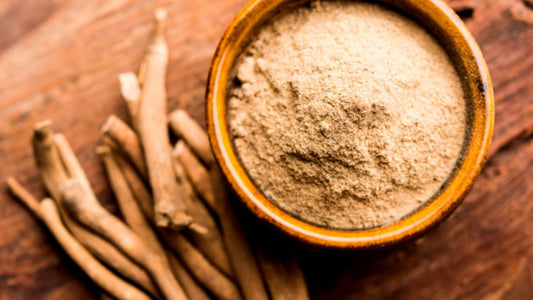
Ashwagandha is gaining a lot of attention and popularity in the natural wellness world, but there are rumors about it causing emotional numbness. You're not alone if you're unsure if ashwagandha can actually “kill” your emotions.
The plant has been traditionally used to help reduce anxiety and increase energy levels. However, separating fact from fear is crucial. This article addresses the science and the concerns directly by showing you how to use ashwagandha responsibly for optimal emotional well-being.
Table of Contents
|
Ashwagandha's Action on Stress & Emotions
Stress is a bodily experience that is brought on by the hormone cortisol, sometimes known as the "fight or flight" response. Prolonged stress raises your cortisol levels, which interferes with your sleep, mood, and general health. This is one area where ashwagandha may be useful.
According to research, ashwagandha may assist in reducing cortisol levels. This can result in a decrease in tension and anxiety levels. For example, a 2012 study found that persons using an ashwagandha pill twice daily had significantly lower cortisol levels.
It's critical to recognize that ashwagandha functions as an adaptogen. That means ashwagandha supports your body's stress response system, helping it bounce back more easily. The goal isn't to eliminate all stress or feelings but to build resilience and help the body and mind adapt to stress.
Misinterpreting Ashwagandha's Calming Effects

It makes sense to be concerned that ashwagandha could make one emotionally numb. A change toward greater peace and balance can feel unusual at first if you're used to feeling worried or anxious all the time. This does not mean that your feelings are vanishing.
Think of it like this: if noise is your constant companion, then a sudden calm moment may seem strange at first. It simply means you're adjusting to a new normal, not that you've lost your hearing.
Similar effects are produced by ashwagandha, which promotes healthy stress reactions that might result in a more composed, grounded state of mind.
Remember that the objective is to control the frequency and intensity of intense emotions such as overwhelm and worry, not to become emotionless. This may result in an overall improvement in emotional regulation and a sense of control.
Potential Side Effects & Individual Variations
As with any supplement, it's important to keep in mind that individual results from ashwagandha may vary. While generally considered safe, it's important to be aware of potential side effects, even if they're uncommon. Sometimes, ashwagandha may cause:
- Mild fatigue or drowsiness
- Upset stomach or digestive issues
- Changes in appetite
Sometimes, these adverse effects are confused with emotional shifts. Oversleeping or experiencing intestinal distress can naturally affect your mood and general state of well-being.
Because of this, it's advisable to begin with a little dosage of ashwagandha and observe your body's reaction. It's a good idea to discuss ashwagandha with your doctor, especially if you have an existing health condition or take any medication.
Organic Ashwagandha – A Premium Option
Our Organic Ashwagandha is a high-quality premium choice focused on purity, potency, and supporting effective support for your well-being.
Organic: It's grown and processed without harmful chemicals.
High Potency: We use standardized extracts to ensure consistent results and deliver science-backed benefits.
Supports Balanced Mood: Our ashwagandha may help with managing stress, promoting calmness, and improving sleep quality, all of which contribute to overall emotional well-being.*
Choosing a high-quality ashwagandha supplement is key to having a positive experience and actually experiencing the benefits. With Idea Supplements’ Organic Ashwagandha, you can trust that you're getting a natural solution you can feel confident in.
Ashwagandha, Emotions, and Your Health Goals
It's important to remember that despite its possible advantages, ashwagandha is not a universal remedy for emotional difficulties. Consult a therapist or physician for expert advice if you're experiencing severe anxiety, depression, or other mental health issues.
However, ashwagandha might be useful in assisting you on your path to general well-being.
In addition to Therapy
Ashwagandha could be a helpful tool alongside healthy lifestyle habits like regular exercise and good sleep to manage daily stressors.
Managing Daily Stress
To assist handle daily stressors, ashwagandha may be useful in addition to healthy lifestyle practices like frequent exercise and restful sleep.
Mild Cases
Ashwagandha, in conjunction with mindfulness and relaxation techniques, may offer support for lesser cases of anxiety or occasional feelings of overwhelm.
While ashwagandha supports stress relief, other adaptogens like maca might have additional benefits – explore the differences here to find the best fit for you. You can also consider taking Maca and Ashwagandha together for synergistic effects.
Consulting your doctor is always advisable before you start supplementation with ashwagandha, especially if you have an existing health condition or take medications.
FAQs: Ashwagandha and Emotional Well-being

Can Ashwagandha completely numb my emotions?
No, according to research ashwagandha may help lower tension and anxiety levels, promoting a sense of calm and balance. It doesn't make you less capable of feeling emotions.
Are there any potential side effects of using ashwagandha for emotions?
Ashwagandha is generally safe, though it in rare cases may cause mild fatigue or digestive upset. It is advisable to lower your dosage or cease taking it if you experience such side effects.
Can ashwagandha be helpful for anxiety or depression?
Some studies indicate a potential benefit, but ashwagandha should never replace professional mental health treatment. Consult your physician or therapist about using ashwagandha for these conditions.
How long does it take for Ashwagandha to show its effects on emotions?
While some people might feel subtle changes in a matter of days, Ashwagandha works best when taken consistently. It might take several weeks to experience the full benefits. To find out more, you can read this article on how long Ashwagandha stays in your system.
Can I take ashwagandha alongside other medications for emotional disorders?
It's very important to consult your doctor before combining any supplements with prescription medications. They can advise you on safe and effective usage.
Is Ashwagandha Safe During Pregnancy?
Even though Ashagandha may be a tempting apoptogenic option during the difficult time of pregnancy, doctors advise against it. Some research indicates that it may lead to a higher risk of miscarriage. We have a full article on this topic.
Conclusion
It can be difficult to sort through all of the information regarding ashwagandha and emotions. Let's review the main conclusions:
Ashwagandha's Potential: Studies indicate that ashwagandha may assist in stress reduction and promote emotional stability. It functions as an adaptogen, facilitating your body's enhanced ability to adjust to stressors.
Myth Buster: Emotional numbness is not a side effect of ashwagandha. It might encourage equilibrium and serenity, which could be interpreted incorrectly if you're accustomed to experiencing constant anxiety or overload.
Responsible Use: Start with a low ashwagandha dose, monitor how your body responds, and consider choosing a high-quality, organic option like our Organic Ashwagandha. Always get medical advice from your physician, especially if you already have any health issues.




